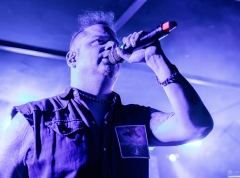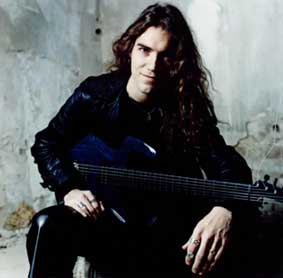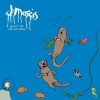Gig Reviews

Thy Catafalque
Stengade, Copenhagen, DEN - 6/4
Album Reviews
Pain Of Salvation
Previous Next
author AP date 03/04/07
After weeks of excitement, sweaty palms and sleepless nights I am finally sitting here in front of him. Daniel Gildenlöw. The mastermind behind one of the most visionary progressive metal bands, Pain of Salvation – so visionary that they take the term progressive so far beyond the genre, where putting them in the same box with bands like Dream Theater would be a shame. After a few seconds of recovering from the hypnosis I recall the tour manager telling me how sick Daniel was and the fact of me being two hours late for the interview (blame the tour manager!), meaning I had to shorten my interview heavily, cutting out all the unnecessary [read: fun] questions. Besides the scarf around the neck there are no other signs of Daniel being ill. He seems to be interested and in the mood. Fredrik (keyboards) joins us shortly. No time to waste!
Marina: Yeah, sure… For and against… [laughs]
Daniel: With a small margin, but still…
Marina: Once again, yeah.
Daniel: Yeah, sure, very briefly. Well, "The Perfect Element part I" is dealing with the symptomology of the individual and "Scarsick" is dealing with the symptomology of a society. So, on the first part we're looking at two main characters, who are kind of broken inside and trying to kind of damage, trying to fill holes with outside stimuli, trying to become whole by finding other things that will fit into the holes that they have, which is the main point of the whole concept of "The Perfect Element", where I kind of use the element as a metaphor for the things that you… If you're using the elements as a metaphor, you could say that in order to be a full human being you need to have all the four elements, when you're formed as a human being. If you don't get that, like in the case with these two individuals, they have a deficiency of the element of fire for love, so they will go through their lives constantly burning themselves on things, trying to fill that with other types of elements of fire, which would be like the drugs, the sex and the drug abuse, whatever. So, we're looking at the first half of "TPE part I" and we have several themes of abuse on an individual kind of level. And if you're looking at "Scarsick" you see the first half of that album having themes of abuse kind of referring to that first part of "TPE part I", but on a social level. So you're looking at themes of abuse on a much more social-political level. And this is done by, since on "TPE part I" we're following the male main character, as he is kind of caught up by the truths about himself and his past and he reaches kind of a mental decline to a point of no return and falling point at the end of the album, and we leave him lying on the floor with all these different emotions, having more or less a breakdown. And this is where we pick up on "Scarsick" with the male main character still lying on that floor. And in that same room you have a TV being on. So you see the outside world or the contemporary society (Daniel: I love that phrase) being displayed through television, which in itself is a kind of an interesting filter, and then again you have the main character also as a sort of filter. And after having seen these different themes of abuse through television, in which America is one of the parts, you get to follow his physical point of no return and his physical falling point. And he serves, in many ways, as a warning sign of, I guess, showing that society in itself is sharing the same symptomology as those individuals. It's a kind of a broken and empty, kind of damaged society that has formed these individuals very naturally and is also trying to find outside stimuli to fill the voids, in many ways. And it's also at risk of being caught up by the truths about itself and by its own past. And if we're not changing our ways, we will go the same way as these individuals are going in "TPE part I".[laughs]
Marina: Change the society – change the people.
Daniel: Yeah, and then the individuals formed by that society will in their turn change society. So it's kind of a symbiosis that needs to be a positive spiral or else it will go, you know… kind of… bad.
Marina: You should have been a politician.
Daniel: I am! [laughs] Not a party politician, but I guess everything is politics in many ways.
Marina: You cannot reveal what it is going to be about yet? [Daniel hesitates] Maybe a tiny hint?
Daniel: Well, we're going to see more of her again – the female main character. And trying to kind of sum things up, I guess.
Marina: So you've got a part of the concept in your head right now?
Daniel: Yeah, and part of the music too. It's going to be… interesting.
It was a lot more difficult to make Daniel spill out about the upcoming album than I thought, so I found myself giving up on the idea quite quickly. Using force might not have been a very popular move either, so I made a decision to move on to more innocent subjects.
Fearing that Fredrik, who throughout these 10 minutes was keeping quiet (disturbingly quiet), meanwhile has fallen asleep in front of the table, I direct the next question at him.
Marina: So you never say: "I'm not playing that shit, Daniel."?
Daniel [breaking into the conversation]: We had an interesting thing, when I and Johan [guitar] did a promotion tour. We came up with this parable about – because someone asked him about if it wasn't annoying to just play someone else's music or something like that. And he was kind of irritated, so we were having a discussion later on that night that he was so annoyed with that question. [Daniel gets enthusiastic] It's just like [coming to the parable now] Pirates of the Caribbean… No one would ask Johnny Depp: "So, isn't it annoying? You didn't write the script, you didn't write your own lines, you didn't produce the movie; you didn't even make your own clothes. I mean, isn't it annoying? What did you contribute to?" It's about doing what you're good at, I guess. Everyone is equally important for the final product.
Marina [Being the megalomaniac that I am]: You can use this power, you know…
Daniel: That's what we're trying to do… [laughs]
Conducted by guest writer Marina Hesselberg.
 Twitter
Twitter Facebook
Facebook












